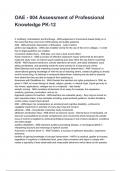OAE - 004 Assessment of Professional
Knowledge PK-12
2. Kohlberg: Individualism and Exchange - ANS-judgement of movements based totally on in
the event that they meet one's OWN wishes and quality pastimes
AAE - ANS-American Association of Educators - code of ethics
perfect use regulations - ANS-rules installed vicinity for the use of the net in colleges - in order
that no legal guidelines are violated
movement studies (four) - ANS-plan, act, have a look at and reflect
Action research is - ANS-a process of reflective classroom inquiry performed by the trainer
inside the study room, to improve pupil mastering (can also refine the way they're coaching)
ADHD - ANS-impulsive behaviors, scholar attentions are short, and easily distracted, issue
sitting nonetheless, and persisting inside the same activity for a long amount of time
Albert Bandura and social mastering concept (reciprocal determinism) - ANS-'Vicarious' or
'observational gaining knowledge of' with the aid of watching others, instead of getting to directly
revel in some thing. He believes in reciprocal determinism, meaning we are able to examine
form others like they are able to research from watching us.
Americans with Disabilities Act - ANS-Granted the identical civil rights protections in 1990, as
given in 1964, to human beings of shade, religion, gender, or natural origin. Equal get entry to
into homes, applications, colleges due to a incapacity - 'ada handy'
analytic scoring - ANS-considers all elements of an essay for example, the expression,
creativity, grammar, punctuation, and so on.
Appraisal systems for teachers - ANS-teachers are evaluated yearly - they may be scored on
each separate phase, a few examples including: pupil-centered guidance, student discipline
control, policy, expert improvement
ASD - ANS-taken into consideration an emotional and cognitive disability - profound to
negligible impairment in activities of every day living and conduct
athetosis - ANS-- immoderate involuntary body movements
attribution (motivation idea) - ANS-where we discover cause - internal locus of manipulate, we
discover success/failure to private competencies and movements where because the outside
locus of control is targeted on achievement/failure because of out of doors situations, conditions
and other people
auditory disabilities - ANS-important auditory processing disease, a neurological deficit in
interpreting structure and meanings of speech sounds
Autonomy vs Shame (level 1) - ANS-Toddlers; a success in bathroom education, experience
autonomy
benefits of gaining knowledge of concept/ behaviorism - ANS-It is practical, applies to humans,
regardless of cognitive or intellectual level, gives clear processes and steps to comply with -
makes a speciality of best observable and measurable behaviors which takes out the paradox
, Bloom's Taxonomy // Cognitive stages (6) *hierarchy from least to greatest - ANS-1.Remember,
2.Understand, 3.Apply, 4.Analyze, five.Evaluate, 6.Create
Bruner // Scaffolding - ANS-Scaffolding - brief, steadily withdrawn assist matching pupil needs
CD cont. In adulthood is referred to as - ANS-Antisocial Personality Disorder - APD: 20% of
young adults who had ODD or CD
Centers - ANS-character themed classroom regions for student choice
Cerebral Palsy - ANS-Neurological deficits on top of things and coordination of muscular moves,
regularly have dyspraxia/ apraxia (motor speech ailment) - impairment of development of motor
coordination which could affect any body component, regularly Spasticity and athetosis
CHARACTERISTICS - ANS-
chunking - ANS-allows the mind to mechanically institution objects for better retention and
learning
Classroom Instruction that teachers can differentiate amongst students - ANS-1. Content to
analyze, 2. The technique students use to grasp content 3. Products college students will
produce, and four. Mastering environment - i.E. How the school room functions and how
students revel in it
code of ethics concepts (1) - ANS-ethical conduct in the direction of college students
code of ethics principles (2) - ANS-Ethical behavior toward exercise and performance
code of ethics ideas (three) - ANS-Ethical behavior toward colleagues
code of ethics standards (four) - ANS-Ethical conduct via dad and mom and network
Cognitive, affective and psychomotor domains - ANS-Cognitive - intellectual competencies,
facts/data/information. Affective- emotional Attitudes that you'll broaden and practice.
Psychomotor- Physical abilities that it is easy to study and applies it thru perhaps physical
education elegance or gambling a recreation after faculty
Conduct Disorder (CD) - ANS-maximum extreme youth psychiatric ailment - students harm
humans and animals, lying, theft, and extreme rule or felony violations
Conductive Hearing loss - ANS-treatable with surgery, medicine or hearing aids
Construct validity - ANS-whether or not a test measures what it claims to be measuring
content analysis of digital data - ANS-see what the source consists of and if you may use it for
the motive you want it for
Content validity: - ANS-whether or not a check represents all of a given construct
convergent vs divergent validity - ANS-whether or not constructs we consider are associated are
actually related vs constructs we agree with are unrelated are definitely unrelated
Correlations among linguistic and cognitive improvement - ANS-vocal and intelligence ratings
are exceedingly correlated
Creative thinking - ANS-generating authentic thoughts, arising with problem solving talents
break away the standard
Criterion referenced assessments - ANS-Student results are not measured on a median of
different students scored like norm-referenced ^, they are as compared to a pre-hooked up
criteria
Criterion Validity - ANS-whether or not a take a look at displays sure skills
ex: concurrent validity: whether or not a check correlates with benchmark records or ex2:
predictive: how well a take a look at predicts ability through testing respondents for a given
construct.




